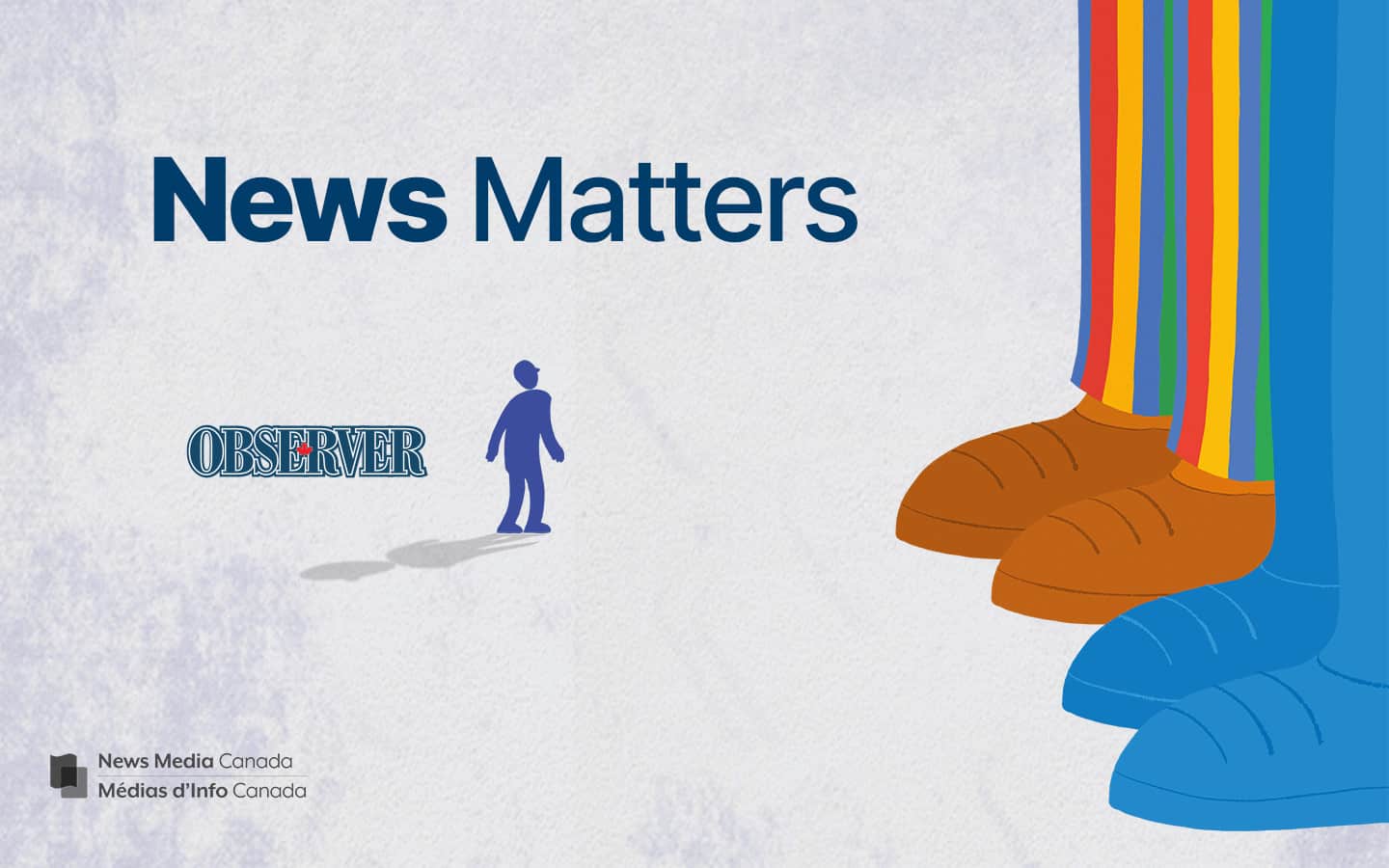High-quality news and information have rarely been more valued in communities across this country. During the first and second waves of the coronavirus pandemic, Canadians have turned to their local news outlets to find out what they need to know to stay safe in their towns or cities.
Paradoxically, those same local news organizations have never been so threatened with extinction.
That’s because the sharp revenue drop resulting from COVID-19 has come on top of years of predation by Google and Facebook, which have a cornered the market —-in Canada and around the world— on consumer data and the digital advertising it earns.
That’s years of journalism and local reporting bleeding revenue, laying off journalists and driving coverage down, down, down. Since the beginning of the Pandemic alone, 48 community newspapers have temporarily or permanently closed. Over 300 have closed in the last ten years.
Facebook and Google are true monopoly destroying a public good, not the water or air this time, but our democracy. Together the web giant own 80% of Canada’s $6 Billion digital ad market, don’t pay taxes, and employ less than 100 Canadians, none of them journalists.
News Media Canada, the umbrella group of Canada’s many publishers big and small, want something done before it’s too late. It released its report on the Levelling the Digital Playing Field, retelling the familiar story of a broken business model and the decline of news coverage.
Yes another report, another call to action. Will it go anywhere at all?
To take Heritage Minister Steven Guilbeault at his word, the Federal government may force Google and Facebook to recycle some of those monopoly dollars into journalism.
The solution News Media Canada wants, and the Minister has warmed to, comes from Australia, the boldest of all sovereign nations to take on the web giants.
The Australians have gone for the low hanging fruit: the undeniable fact that Google’s search engine and Facebook’s news feed are grabbing the publishers’ news content off the Internet, without paying for it, so they can attract everyday netizens like you and I to their platforms, while they make billions selling our eyeballs to their advertisers.
The publishers —-in Australia and around the globe—- want Google and Facebook to pay for their content.
The Australian model, on the verge of being implemented by their Competition Bureau over the vigorous objections of Google and Facebook, sets up a collective bargaining regime between publishers on one side and the web giants on the other.
A stand-alone publisher can use the model to negotiate directly with Google and Facebook (good luck) or combine as a group for more bargaining power.
Since alone or together the publishers have very little bargaining power —-it would be suicide for them to “strike” Facebook and Google by quitting those dominant platforms—- the Australian model offers binding arbitration in case the web giants stonewall the bargaining, something as a labour leader I have seen powerful companies do from time to time.
Facebook’s Mark Zuckerberg has already responded by threatening to pull the plug on their Australian news feed altogether, something us labour leaders would call a lockout.
Google has more finesse than Zuckerberg but still insists they provide more value to publishers through public exposure of their product than the publishers’ content provides for Google.
Google also wants to bicker over what “Publisher Content” is: whether a link to a news article counts, or whether their search engine AI-driven summaries of news content can even be traced to publishers’ content, or whether the news article is really worth paying for at all.
But here’s the problem with the Australian model: its focus on paying for content is missing the real abuse of Facebook and Google’s monopoly power which does just not come from poaching publisher content but from its cornering the digital advertising market around the globe, a monopoly that gets bigger every day by the Google search engine and Facebook newsfeed scraping our personal data which, in turn, allows them to provide paying advertisers with an unbeatable product.
Their monopoly won’t end any time soon: the web giants can only be reined in by American governments, and that effort has only just begun and will last a decade with an uncertain outcome.
It may sound hopeless for Canada, but it isn’t. It just takes a little political courage.
Three years ago the federal government asked an expert panel to advise how Canadian media might survive the onslaught of global digital giants like Netflix, Facebook, and Google.
The report of the blue-ribbon Yale Committee in January 2020 proposed a news fund bankrolled by regular contributions from Facebook and Google, like a monopoly-licence fee that funnels dollars right back into public journalism.
It’s not really a novel idea. We already have news funds on the go in Canada: the 150 year old Canadian Periodical Fund, the Federal Aid to Written Journalism program, and the Independent Local News Fund for non-network local television stations.
If journalism is essential to democracy, and it is, it’s time to go for the best Canadian solution we can find.









